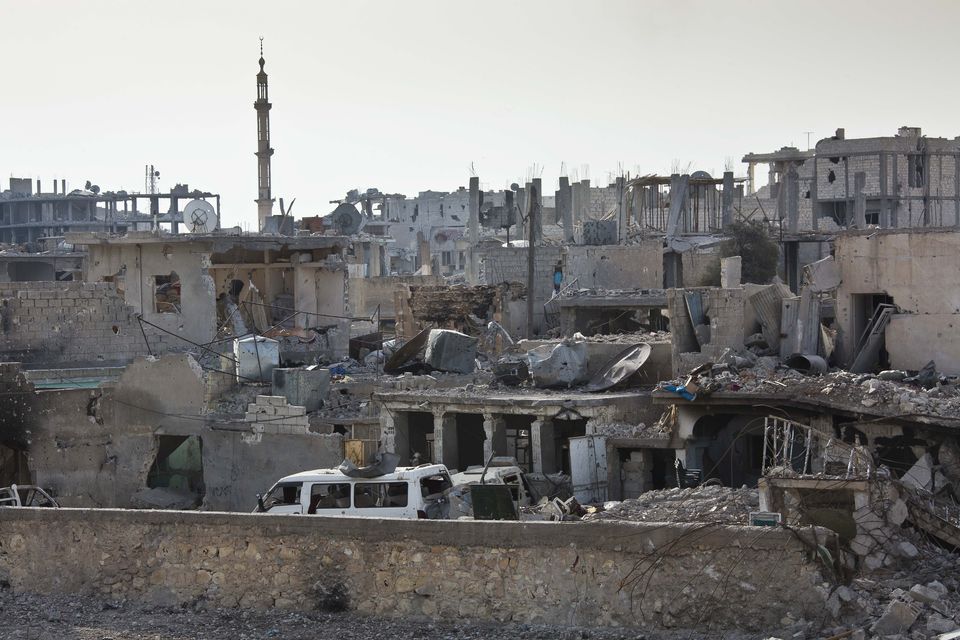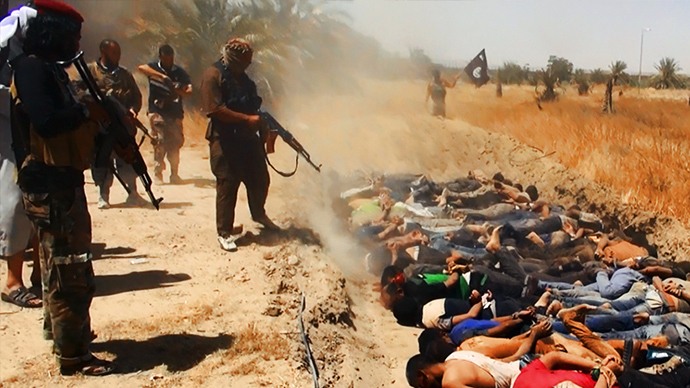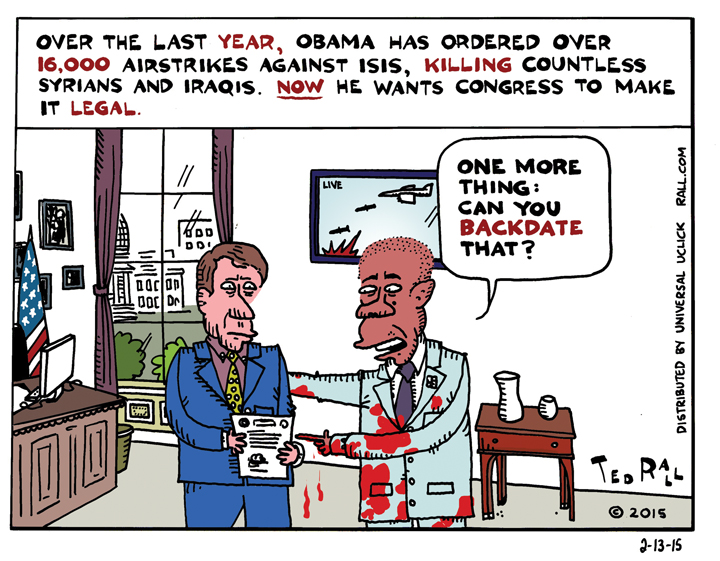In an interview President Biden called Russian president Vladimir Putin a “killer.” Obviously it takes one to know one, but what if you’re not mentally aware enough to know yourself?
Backdate
For nearly a year, the Obama Administration has waged a high-intensity air campaign against the Islamic State in Syria and Iraq, killing thousands of Iraqis and Syrians, including many civilians. Now they’re finally asking for retroactive authorization from Congress, as mandated by the Constitution, for doing what they’ve already done. So much for a nation of laws.
SYNDICATED COLUMN: Why Are We At War with ISIS?

Is there any justification at all for bombing ISIS?
There isn’t any Congressional authorization, much less a declaration of war. Is there even a good reason for the U.S. to be involved?
There is no better time to ask this question than now, as much of the world (me included) is disgusted by the Islamic State’s beheadings of two kidnapped Japanese nationals, the second one an acclaimed journalist and humanist who lost his life trying to rescue the first.
It is easy to forget, too easy, that for Americans going to war was until recently an act undertaken only after every other alternative had been thoroughly explored and completely exhausted, that the bar for casus belli was high, and that war wasn’t the standard response to outrage or international crisis, but quite unusual, a deviation from the normal order of business. Hard to imagine now, but the United States did not declare war against Germany after its U-boat torpedoed and sank the RMS Lusitania in 1915, killing 1,198 passengers, including 128 Americans. Instead, President Woodrow Wilson demanded compensation and a promise from Germany not to do it again.
War has since become much too easy.
We go to war fast, without national discussion — much less debate. We go to war indiscriminately. We war against several nations (Afghanistan, Iraq, Libya, Syria), at the same time we’re warring against a tactic (terrorism), as well as various so-called “non-state actors” (discrete branches of Al Qaeda, Khorasan, Abu Sayyaf). War, war, war, all the time. So much war we think it’s normal that, especially when someone/something/some group does something we deem wrong, like slitting the throats of reporters as GoPros record the bloodshed in glorious high resolution, war is the knee-jerk response.
Yet, as the Lusitania example reminds us, this was not always the case, and so this is not how it necessarily must be.
In just one single day over the past weekend, the U.S.-led coalition carried out 27 airstrikes against ISIS-held territory in Syria and Iraq. We have no way to know how many ISIS soldiers, and civilians, were killed or wounded in those bombardments.
U.S.-led forces are responsible for at least 16,000 airstrikes against ISIS in the last six months, killing an unknown number of people — but guesstimates logically begin in the tens of thousands, including civilians. Despite all that carnage, the air campaign has not had the desired effect: ISIS is stronger than ever, continuing to conquer new territory and consolidate control over old ground, and the authoritarian government of Syrian President Bashar al-Assad, an adversary of the U.S. its ally Israel, is benefiting as well.
American war officials concede that the air war is failing. “I think [the war against ISIS] may require a forward deployment of some of our troops,” U.S. Secretary of Defense Chuck Hagel told CNN. “I would say we’re not there yet. Whether we get there or not, I don’t know.”
“This is going to be a long, nasty, dirty war that in many ways is going to look a lot like the first go-around in Iraq,” Stephen Biddle, ex-adviser to Army General David Petraeus, told U.S. News & World Report.
But…why?
Why are we in this “long, nasty, dirty war” against ISIS?
Why aren’t we asking why we are at war against ISIS?
No one is arguing that the Islamic State is run by nice people. ISIS has carried out ethnic cleansing, enslaved women, raped children, slaughtered POWs in summary executions and Talibanized areas under their control, imposing their brutal, brutal medieval version of Sharia law on citizens accustomed to modern life under socialist, secular states.
But ISIS is not alone in its barbarism.
Saudi Arabia routinely carries out public beheadings and floggings, as well as crucifixions, and treats women like dirt. Yet we don’t bomb them. To the contrary, the Saudis are close allies. President Obama cuts short important diplomatic trips in order to join the Saudis as they mourn their dead king.
Another close U.S. ally, the government of the Central Asian republic of Uzbekistan, either boils or freezes political dissidents to death, depending on the government’s mood. Quirky! No air raids there either.
Among the worst nations on earth for human rights abuses are Yemen and Pakistan, both of which like ISIS are fundamentalist Islamist regimes, but receive hundreds of millions of dollars in American weapons and cash.
So what’s special about ISIS? Why did we go to war against them?
“When it comes to human rights abuses, they (Islamic State militants) are in a class of their own,” Senator Barbara Boxer (D-CA) said last summer in support of a Congressional resolution supporting America’s newest war. But that’s not true. ISIS is no worse than any number of other regimes we choose to leave alone (or actively support).
The New York Times’ editorial board says ISIS “poses a dire threat to the United States and its allies.” How so? They can’t attack the U.S. Yes, they’re in Iraq, which we kinda sorta view as an ally after invading it, but that war was lost in 2003. ISIS can’t invade Israel. So why are we attacking them? And why aren’t we asking why?
War is serious business. It takes lives, costs money, destroys infrastructure and the environment, and creates new problems, including laying the ground for future wars. The least — the very least — we can do is think about it, and talk about it, before starting one, and then letting inertia carry it on.
(Ted Rall, syndicated writer and cartoonist for The Los Angeles Times, is the author of the new critically-acclaimed book “After We Kill You, We Will Welcome You Back As Honored Guests: Unembedded in Afghanistan.” Subscribe to Ted Rall at Beacon.)
COPYRIGHT 2015 TED RALL, DISTRIBUTED BY CREATORS.COM
SYNDICATED COLUMN: “Ask the Pundit”: What Should the U.S. Do About ISIS?

Reader Brian McManus asks:
“Just wondering if you can find time to post a piece on what the U.S. should do (or not do) regarding the current situation with ISIS in Iraq. Not so much on how the situation got to be where it is, but what the U.S. and/or other nations should do in situations like this. Would appreciate your thoughts on the issue.”
Thanks for writing, Brian.
Americans are “can do” people. Optimism is an appealing national personality trait but it comes with the unfortunate tendency to overestimate what can be done and its more dangerous corollary, the will to act when doing nothing would be preferable.
We saw the pitfalls of can-do following 9/11. Initial reactions to the attacks were shock and confusion. Traditional ideological divides were blurred, but in those early days one could still discern the pre-GWOT liberal tendency toward treating terrorism as a law enforcement issue, versus the old hawkish rightist desire to lash out militarily. Then the Right trotted out a line that resonated across the spectrum and caused the antiwar left to dissolve as into mist:
We have to do something.
In the United States, “something” means military action.
The thing we “have” to do “something” about always refers to foreign policy.
Americans don’t feel that “have to do something” about domestic problems. Poverty? No need to act. Corrupt bankers? Inaction is fine. But if a crisis flares up overseas (a civil war as in Syria or Libya, a siege of civilians as in Sarajevo or Iraqi Kurdistan, cross-border encroachment as in ex-Soviet Georgia or Crimea), and especially if it involves opponents the media categorizes as “bad guys” (regional economic rivals such as Iran, China or Russia, radical Islamists who may or may not have gotten their guns from us), “we” “have” “to” “do” “something” (military action).
This is not true.
There are always alternatives to military action. The success of the formerly Al Qaeda-affiliated Islamic State of Iraq and Syria insurgency, which controls half of both countries, is no exception. Half-measures come in both military (money and weapons) and non-military (political advisors) forms.
We can do nothing.
Albania is doing nothing in Iraq. Cuba is doing nothing in Iraq. Vietnam is doing nothing in Iraq. These countries have not been harmed by their refusal to intervene militarily in Iraq.
As I see it, Brian, whatever appetite ordinary Americans have for Obama’s airstrikes against ISIS and other attempts to prop up the current regime in Baghdad stems from the investment of lives and treasure the U.S. has made since the 2003 invasion.
“To be sure, the cost was high,” then-Secretary of State Leon Panetta said when Obama ordered the main troop withdrawal from Iraq. “But those lives were not lost in vain. They gave birth to an independent, free, and sovereign Iraq.”
If ISIS captures Baghdad and establishes Taliban-style Sharia law throughout Iraq, complete with amputations of accused thieves and stonings of wayward women — leaving Iraq, already in worse shape than it was under Saddam, an unequivocal nightmare for its people and a base for radical jihadis out to overthrow U.S. allies like Saudi Arabia — Panetta’s statement will have been belied.
The war will have been exposed as a total waste.
Which it was. Every American who lost a life or a limb in Iraq was sacrificed stupidly, predictably, in a war that never could have been won even had the generals and politicians in charge of it weren’t idiots.
The attempt to salvage Iraq by saving the rump Iraqi state inside the Green Zone is a refusal to accept defeat. But that doesn’t change reality.
We lost the Iraq War years ago. The sooner we accept that there is nothing to be saved there and move on, the better off we’ll be.
Undeniably and regrettably, washing our hands of Iraq — aside from leaving ISIS alone, we ought to evacuate the embassy and other government personnel Obama says we need to “protect” — will result in awful consequences. Whether or not ISIS can close the deal by capturing Baghdad, the sectarian conflict will escalate. Areas within ISIS control will be lost for the foreseeable future. More civilians will die, many as the result of “ethnic cleansing.”
We know these things will happen because we’ve lost wars before. The U.S. withdrawal from Vietnam created the “boat people” crisis, opened space for wars between Vietnam and its neighbors China and Cambodia, and permitted a communist regime hostile to U.S. interests to consolidate power, and exclude American business for decades.
But consider the alternative.
Remaining in Vietnam would have required pouring more money and more soldiers down a hole, and slaughtering countless more Vietnamese. We still would have lost. All that post-withdrawal stuff — the civil conflicts, reprisals against our former local collaborators — would still have happened. It just would have happened later.
After we accepted defeat and walked away from Vietnam, on the other hand, things eventually worked out. Vietnam is now a major U.S. trading partner; nearly half a million American tourists visit Vietnam each year.
A guy named Barack Obama once summarized his foreign policy as “Don’t do stupid stuff” like invading Iraq in the first place. Hillary’s jibes and Obama’s actions aside, it’s good advice. To which I’ll add Ho Chi Minh’s legendary order to his general Vo Nguyen Giap, who was planning the decisive 1954 battle that would expel France from Indochina: “If victory is certain, then you are to attack. If victory is not certain, then you must resolutely refrain from attacking.”
Victory against ISIS is anything but certain. Therefore, in this and similar situations, I would refrain from attacking.
(Ted Rall, syndicated writer and cartoonist, is the author of “After We Kill You, We Will Welcome You Back As Honored Guests: Unembedded in Afghanistan,” out Sept. 2. Subscribe to Ted Rall at Beacon.)
COPYRIGHT 2014 TED RALL, DISTRIBUTED BY CREATORS.COM


